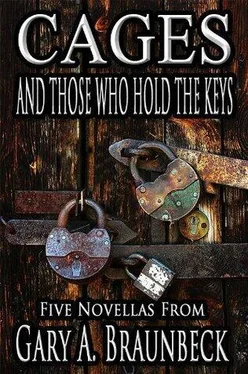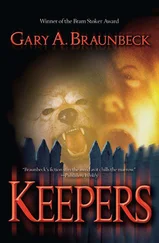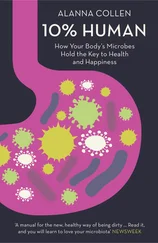A click, a hiss and a hum; the distinctive noise of the television coming on, the picture coming into focus, the static fading out of the speaker as the sound of some country music program faded in.
She looked at her brother. He was not holding a remote control.
Because the set never had one.
“Seven-thirty,” said Alan matter-of-factly. “Time for Hee-Haw .”
Marian balled her hands into fists, feeling her knuckles crack under the pressure. Hee-Haw had been her parents’ favorite program.
“Come on, Alan. I’m going to take you back to my hotel room, get you cleaned up, then we’re going to get something to eat, and then you’re going to get some sleep. When you wake up we’ll finalize details here, and you’ll come with me to L.A. for a while.”
“I can’t leave. The family depends on me.”
Only now did she notice that Alan was wearing Dad’s favorite pajamas, the gray ones with the white and blue diamond pattern. A small bloodstain near the crotch had dried and stiffened.
Don’t say anything , she thought. Not yet.
And don’t think about that thing sitting on the couch behind you.
Alan smiled, a crooked smile that held some residue of the brother she remembered. “I’m sorry, Sis,” he said, sitting down at the table. “I suppose I ought to explain things.” He took hold of her shoulders. “Look at you, so nervous and frightened. Did I do that? I’d apologize for scaring you but, after all, it’s Hallowe’en. Don’t go anywhere, I’ve got something to show you. It was going to be a surprise from Dad, but....” He walked over to the television and pulled the cover off a new VCR perched atop the set. “Dad bought this not too long ago, after you got that national perfume commercial. He taped all of your commercials and those cop shows you did bit parts on. He was really looking forward to your sitcom pilot next month.”
Marian was silent. For most of her adult life Dad had never said anything about her chosen profession, never given the smallest hint that he was proud of her accomplishments. She closed her eyes and tried to imagine her father sitting alone in this room, watching his daughter over and over as she sprayed herself with perfume or ran screaming from make-believe thugs. Would he have done all that if he hadn’t been proud?
Why didn’t you ever tell me? she wondered.
The doorbell rang, followed by a children’s chorus: “Trick or treat!”
Alan raised a finger to his lips, signaling silence, then rolled up the sleeve of the pajama top, revealing the dark-stained bandage around his wrist.
The bell rang again, followed by insistent knocks. The children giggled.
“Just a minute,” called Alan, walking over to the slumped figure of Jack Pumpkinhead, whose light was nearly gone. Alan grabbed Jack’s stem and lifted the top off, then ripped the bandage from his arm.
“W-what’re you doing?” said Marian.
“Jack needs a recharge. I can’t deny him a drink when he needs one.” Alan bit into his wrist and tore away a large, crusty scab, freeing his blood to drip into Jack’s head.
The blood ignited Jack’s inner flame, a brilliant flash of orange-red that sent a chill through Marian. She found herself staring at an exposed patch on the quilt, trying to remember when Mom had made it; she stared at it because as long as her gaze was elsewhere, she wouldn’t have to acknowledge what was happening in the periphery, wouldn’t have to admit that she wasn’t imagining it, that Jack Pumpkinhead was rising off the couch, towering almost seven feet, reaching for his stem-cap.
So she stared at patch on the quilt, remembering...
* * *
High school was a breeze for Marian. Girl’s Glee and Drama Club her sophomore year; Cheerleading Squad, Concert Choir, and Acting Ensemble her junior year, Pep Squad Captain, president of Dram Club, Swing Choir, and both the Homecoming Court and Prom Queen her senior year. If anyone’s high school years could be called dream-perfect, they were Marian’s. In those three years her sense of balance and security remained; every time she looked into the faces of her parents and brother, that expression of pride was there. A few times it bothered her that there seemed so little she could do to help her family, but those feelings quickly vanished when she told herself that she was doing everything she could to make them proud of her and that should be enough. She was only human.
A few weeks before graduation she was ecstatic to find she’d been granted a scholarship at one of the best Liberal Arts schools in the country, and— after a summer stint as a bank teller — she went on to study Theatre, the biggest love of her life. Mid-way through her second year she auditioned on a whim for a traveling company production of ‘night, Mother and nearly fainted when the call came to her dorm room informing her that she’d been cast in the role of Jesse. It paid three hundred and twenty-five dollars a week, including the producers picking up all traveling and motel expenses.
It was a young actress’s dream come true.
Through those first two years at college she rarely saw her family, except at Christmas. She wrote home once a week, faithfully, and never once had to ask them for any money to help her get by; she’d snatched up a teller position at the town’s local bank and worked two days a week and on Saturday, which netted her enough money for groceries, books, and twice-monthly partying on the town; it was on one of these excursions that she read the notice for the traveling company’s auditions. Theatre was her major, so she decided to go for it; after all, why go on studying to become an actress when there was a chance she could actually be one?
Her parents were very pleased with her good fortune but did not hide their dismay that she wouldn’t be finishing college. Marian eased their fears by reminding them that she was a fine bank teller and could always find a job if things fell through. Mom and Dad had both smiled, but she sensed her confidence did little to ease their fears.
During the first leg of the tour she contented herself by having a brief affair with the stage manager and devouring her good reviews, which came as a relief to her. Marian had never been much for the Method school of acting but found herself, during the first weeks of rehearsal, wishing that she’d given Stanislavsky more credit and attention. The role of Jesse was a bitch to play, requiring her to show an emptiness and isolation she couldn’t even imagine. Having never really experienced that measure of desperation she didn’t know if she could pull it off.
Then her mother died of a stroke.
Marian was unable to cry at the funeral, though she very much wanted to. She was too busy studying her dad’s ragged and lonely face, telling herself that that look was exactly what she needed for Jesse.
After the funeral she tried to talk with Alan, who only sat at the picnic table in Aunt Boots’s back yard while the other guests snacked on after-burial munchies and offered polite sympathies. Eventually she wound up going off with Laura, then Alan’s wife. Laura, though always beautiful, looked frazzled around the edges to her.
“What’s wrong?” asked Marian.
“Your brother,” she said. “I understand that when someone dies you have a natural proclivity to talk about them, but since your mother died he keeps...I don’t know how to say it... going on about things.” They sat in two folding lawn chairs at the far end of Boots’s yard, picking at the two pieces of pound cake they’d taken from the snack table.
“He keeps talking about how bad he feels that your parents never had any time to do things they wanted to do.”
Читать дальше












